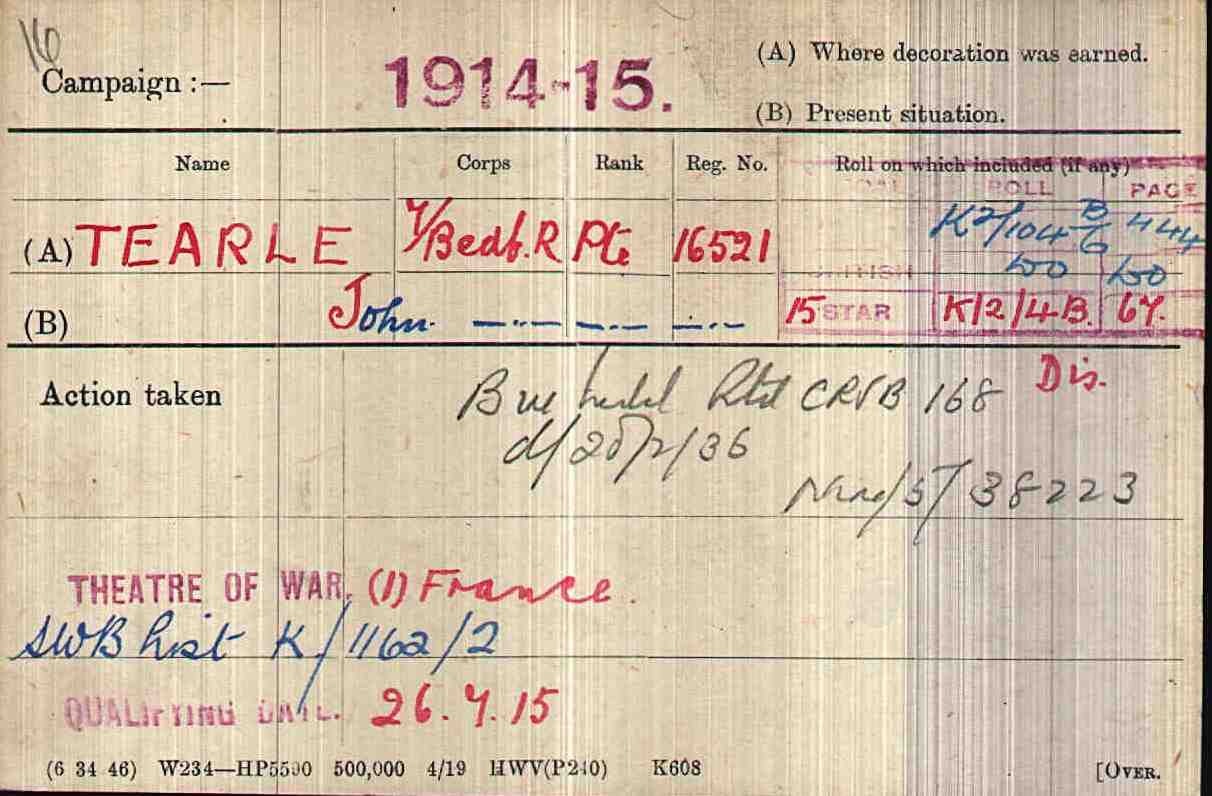Tearle, J
Lance Corporal
7th Bedfordshire Regiment of “South View”, Princess Street, Toddington, Bedfordshire.
“National Roll of the Great War” says:
This is John Tearle 1896 of Toddington, son of Joseph Marlow Tearle 1865 and Emily nee Evans. Military serial number 16521, 7th Beds Regt. I am not sure why National Roll has him in the 6th Regiment, because his medals card (below) clearly says 7/Beds.R.
Here he is in the 1911 census:
His father, Joseph appears to be working a dairy herd on his own farm. His mother, Emily, and May, his elder sister are machinists for a hat manufacturer. It is not clear if the factory is in Toddington, or whether the women are working at home on machines they have been supplied with. The evidence above suggests that Emily has her own machine, and May walks to work. This is in the fading times of the straw hat business in Bedfordshire, but a large number of women, girls and boys were employed in the straw-plaiting and hat-making industries.
William is in a cement works and John would appear to be the runner who delivers telegrams for the Post Office.
The only other morsel of evidence I have for John’s entire life is his medals card:
You can see how early he started in the war, but National Roll tells us that he joined the 7th Battalion, The Bedfordshire Regiment, in September 1914. Was he one of those brave young men who really did think the war would be over by Christmas, and it was an adventure not to be missed? His effective date for war pension and service medals was 26 July 1915, the day his ship dropped him and others of his unit in France.
If you look carefully at the statements by National Roll, John was thrown into the very thick of the greatest battles of The Great War. He was at Arras, he was in the Somme, he was at Wipers. How on Earth did he survive? Someone took pity on his injuries and he was sent to England (and anywhere else in the then UK) to perform light duties for the army. It is impossible to imagine what was in his head every time he heard a loud noise, whenever he went to bed, what nightmares he endured even when he was awake. When you are 18-23, things that happen to you then, stay with you vividly and uneraseably for the rest of your life. It must have been a doctor or a senior officer who had some streak of humanity to see that John was no longer fit to be a soldier, who devised a way to get him to safety. Surely he had served his country with distinction, and he was good enough to have been promoted to lance corporal.
As far as I know, he never married. Little wonder, I think, if you look at his length of service, the battles he was engaged in and the number of times he was injured and returned to service. He fought through the entire First World War, and then at the end of hostilities he still had to wait another six months before he could go home.
His grandmother was Sarah Tearle, an unmarried mother of three when she married John Marlow of Toddington in 1868. Judging by the names she had given the first three children, all born in Sundon, Bedfordshire, they look like John Marlow’s children, and Joseph himself was the second one. Sarah married John Marlow in Toddington, in August 1868. Because of his name we follow John’s ancestry to Sarah’s parents who were Joseph 1797 and Sarah nee Millings, Joseph’s parents were William 1769 and Sarah nee Clark, and William’s parents were Joseph 1737 and Phoebe nee Capp.


